#drupal for less techies
Explore tagged Tumblr posts
Text
Top 7 Ways Content Management Systems Help Non-Techies

Most people think of content management systems (CMS) as something only tech-savvy people can use. However, that’s not the case! In this article, we’ll show you seven ways that non-techies can benefit from using a CMS.
What is a Content Management System?
A content management system (CMS) is a software application that helps non-technical users create, edit, and publish website content. A CMS makes it easy for anyone to create and manage a website, without needing to know how to code or design.
There are many different types of CMS applications available, each with its own set of features. Some popular CMS applications include WordPress, Drupal, and Joomla. Each CMS has its own strengths and weaknesses, so it's important to choose the right one for your needs.
A CMS can be a great tool for businesses or individuals who want to create a website but don't have the time or resources to do it themselves. With a CMS, you can quickly and easily create a professional-looking website without needing any coding or design skills.
Benefits of using a CMS
There are many benefits of using a content management system (CMS). A CMS can help non-techies to easily create and manage website content. Here are some of the top benefits of using a CMS:
A CMS can help non-techies to easily create and manage website content. This is because a CMS provides an easy-to-use interface that anyone can use to add, edit, and delete content on a website.
A CMS can help to improve the usability of a website. This is because a CMS usually comes with features such as drag-and-drop functionality and WYSIWYG editors that make it easy for even non-techies to create and manage website content.
A CMS can help to improve the SEO services of a website. This is because most CMSs come with built-in SEO features that help to optimize website content for better search engine visibility.
A CMS can help to reduce the cost of website development and maintenance. This is because a CMS usually requires less development and maintenance than a traditional website.
Overall, there are many benefits of using a content management system (CMS).
Ease of use
One of the best things about content management systems is how easy they are to use. Non-techies can quickly learn how to add and edit content, without needing to know any coding. This makes it much easier for businesses to create and manage their website content, without needing to hire a web developer.
Content management systems also make it easy to manage multiple users. Non-techies can easily add new users and set up different permission levels. This is perfect for businesses who need to give multiple employees access to their website content.
Another great thing about content management systems is that they come with a lot of features built-in. Non-techies can easily add images, videos, and other media to their website content. They can also create forms, surveys, and other interactive content. This saves businesses a lot of time and money, as they don't need to hire a separate developer to add these features.
Overall, content management systems are a great solution for businesses who don't have a lot of tech experience. They are easy to use and come with a lot of features built-in. This makes them the perfect solution for businesses who want to create and manage their own
Collaboration features
Collaboration features: A content management system typically includes features that make it easy for a team to work together on a project. For example, many CMSs include a “check out/check in” system that lets multiple users work on a piece of content without overwriting each other’s changes. This can be a big help for teams who need to collaborate on projects.
User-friendly interface: Another big benefit of using a CMS is that it usually has a user-friendly interface. This means that non-technical users can easily add, edit, and delete content from the website. This can be a big time-saver for businesses who don’t have the resources to hire a web developer to make simple changes to their website.
Flexibility: Content management systems are also typically very flexible, meaning they can be easily customized to fit the needs of any business. For example, many CMSs allow businesses to add their own plugins or themes to change the look and feel of their website. This can be a great way to create a unique website that matches your company’s branding.
Security features
Security features: A good CMS will have robust security features to protect your website from hackers and other online threats. This is especially important if you plan to sell products or services on your website. A CMS with strong security features will help to keep your website and your customers safe.
Ease of use: A CMS should be easy to use, even for people who are not very tech-savvy. It should have a user-friendly interface that makes it easy to add, edit, and delete content on your website.
Flexibility: A good CMS should be flexible enough to meet the needs of your website. It should be able to handle different types of content, including text, images, videos, and more. It should also be able to scale as your website grows.
Support: When choosing a CMS, be sure to choose one that offers good customer support. This way, if you run into any problems, you can get help from someone who knows the system well.
Cost: Be sure to consider the cost of the CMS when making your decision. Some CMS platforms are free, while others can be quite expensive. Be sure to choose one that
Automation features
A content management system, or CMS, is a software application that helps users create, manage, and publish digital content. A CMS typically has three components: a content management interface (CMI), a content delivery interface (CDI), and a content repository (CR).
There are many benefits of using a CMS, but one of the most helpful for non-techies is the automation features. With a CMS, users can automate repetitive tasks, such as publishing blog posts or creating social media posts. This can save a lot of time, especially for users who are not familiar with coding or other technical aspects of custom website development services. Automation features can also help to reduce errors and improve the overall quality of the website.
Another benefit of using a CMS is that it can help users manage large amounts of content. A CMS can help users organize content into categories and subcategories. It can also provide tools for search engine optimization (SEO) and social media marketing. This can make it easier for users to find and share the content they are looking for.
Overall, a CMS can be a helpful tool for non-techies who want to create and manage digital content. The automation features can save time and improve the quality
Conclusion
Content management systems (CMS) are an incredible tool for non-technical users to help create and manage website content. By using a CMS development services, you can easily create or edit pages without having to know HTML or other coding languages. Additionally, most CMS platforms come with a wide range of plugins and themes that allow you to customize your site to match your specific needs. Whether you're looking to build a simple blog or a complex corporate website, using a content management system is one of the best ways to get started.
0 notes
Link
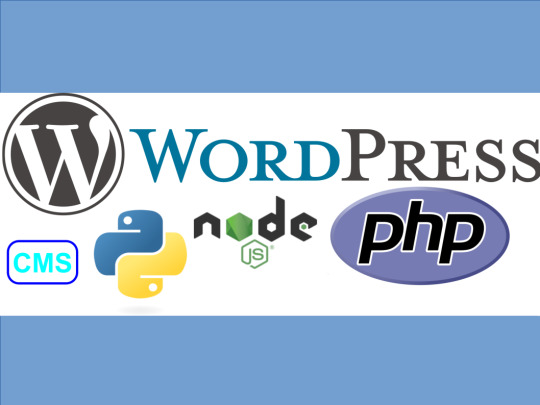
WordPress is powerful and versatile and it powers more of the internet's web pages than any other engine.
But it's not a perfect fit for everyone. And perhaps you're looking for something different. So let me help guide you through the confusing world of modern web Content Management.
To do this we'll compare the top Content Management Systems (CMS) built from each of the three dominant programming language families: PHP, Node, and Python.
All the options I’ll explore are open source. Which is fitting, since in many ways, WordPress was a pioneer in open source platforms.
However, some of us are looking for a more modern, faster, more secure CMS. And we still don’t like the closed-source ones like Squarespace and Wix.
What seems to be happening is that people are moving away from CMS platforms built on a single engine, MVC paradigm to a more decoupled system.
For example, does your website's blog really need a full database? And could your eCommerce or payment system use a simpler headless paradigm?
So let's see what's available, arranged by language.
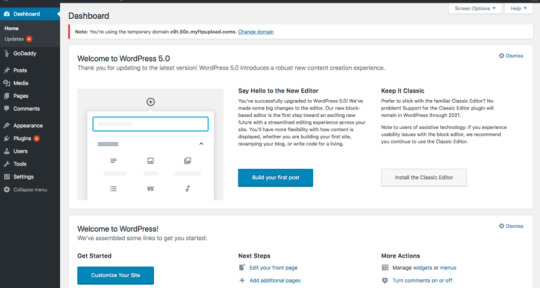
PHP
PHP is a simple, reliable and well maintained language. So it's no surprise that it came to be the most popular backend of the entire web.
Its versatility makes it easy for developers to provide such large arrays of features and plugins for their CMS's. In short, PHP was basically originally invented for the CMS.
A downside to WordPress's popularity is that its plugin marketplace is hard to navigate or, in some cases, maybe it's too expensive.
However, WordPress may not be unique in that sense. Here are some other PHP CMS frameworks:
Drupal
Joomla
Magento
Grav CMS
The first three all have the same issue as WordPress: a bloated interface or an overcrowded plugin marketplace.
But Grav felt like a breath of fresh air. It's a bit like a simplified WordPress without all the complex bloatware. There isn't even a database, just folders and pages.
It attempts to give you the best of both worlds. Grav has an admin dashboard plugin for non techies to manage everything as they would with WordPress.
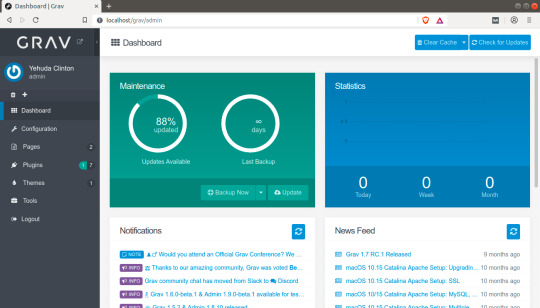
At the same time, Grav also delivers the stability and customization of a decoupled system. You don't even need an admin GUI if you don't want it.
Node
Node.js, the newest language to hit the back end market, is innovative and unconventional. Since it's already a popular language for front end web development, it seems like Node is making a play for most popular programming language everywhere.
Node deployments often rely on tech stacks such as NoSQL databases such as MongoDB, NGINX web servers, and Markdown. An advantage of a Node.js-powered CMS is that it tends to integrate well with web apps.
Here are a couple of Node.js based CMS's:
KeystoneJs: Complex. More of a framework than a CMS.
Ghost: Simple. Doesn’t do much more than Medium, which is perfect if you want to self host your Medium blog. You can add decoupled eCommerce like Shopify.
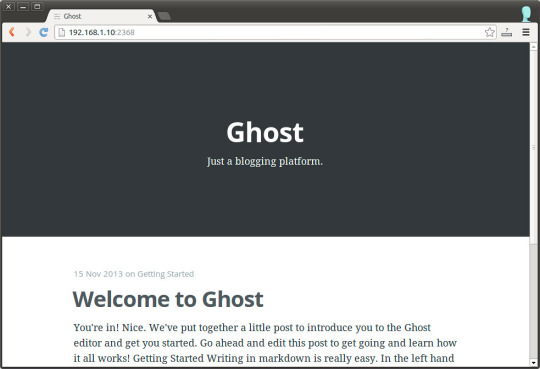
From a market-share perspective, Ghost seems to be the only new CMS that is positioned to take a bite out of the WordPress monopoly.
Python
Although Python is known as a powerful scripting language, in recent years it has matured to be an all around server-side language. However it still has a much less developed plugin and themes market for its CMSs.
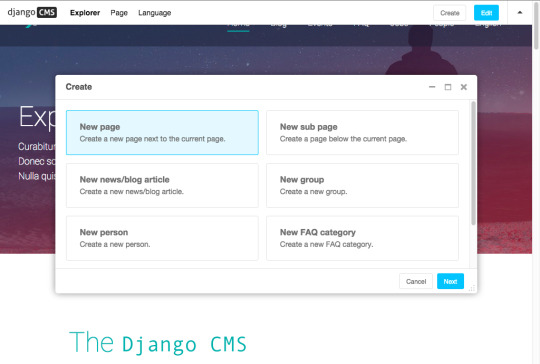
Here are a few popular Python based CMS platforms:
Django CMS: Requires a bit more code know-how than WordPress
Mezzanine: Also built on Django. Many features, but you still need to know Python for advanced functionality.
Storyblok: friendly editor interface and headless api for apps but limited plugins
Python has the advantage of speed in certain situations. And so Python frameworks will potentially scale up much more efficiently than JavaScript. Also this is why they will often run better on inexpensive hardware such as a Raspberry Pi.
These Python-based CMSs might also find their niche when integrating with a domain that is dominated by Python. What areas are we talking about here? Check out this article and find out what Python is used for.
All the same, I doubt Python will ever be a major contender in the CMS market. Mainly because it came very late to the web. The lack of backwards compatibility between versions is an issue as well.
Conclusion
If you are ready to embrace the future of the CMS, here are the keys to making an informed decision.
Consider all the factors that will most likely give you all the security, reliability, and customization you need.
0 notes
Text
Tips on using Drupal for non-developers
You don’t have to be a programmer to use Drupal, but you need to commit to studying it to be able to use it proficiently.
The flexibility and power of the system mean there are many moving parts to wrap your head around, but once you do you’ll find you can achieve almost anything.

If you consider yourself less techie, here are some of the practical things you need to remember when creating a website using Drupal.
0 notes
Text
Drupal and the non-programmer
Drupal CMS has a reputation for being powerful, flexible and popular but also, unfortunately, difficult for people who are not programmers.
But Drupal has evolved over the past few years.

(Image source: Shutterstock)
With the help of its devoted community of developers, the latest Drupal versions have become much easier to use even for non-programmers - and the future promises to be even brighter, with Drupal 8 containing and whole new swag of usable goodies.
Click this link to continue reading "Drupal and the non-programmer"
0 notes